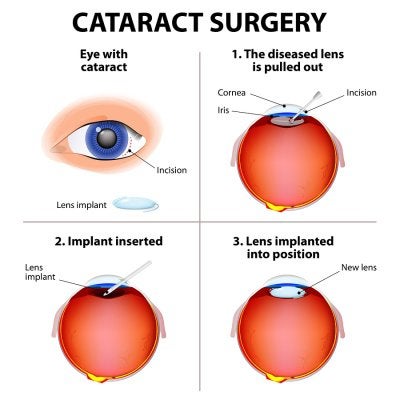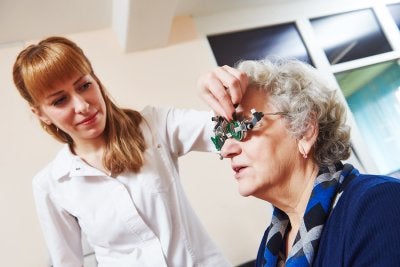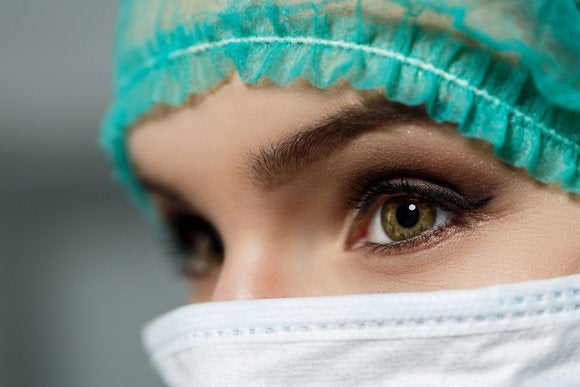-
Recognizing Healthy Vision Month
Every May, the National Eye Institute celebrates Healthy Vision Month to remind people of all ages to stop and pay attention to their eye health. After all, while you may see your doctor for an annual physical, many people only see an eye doctor when they have an issue, which means you could be missing out on important preventative care. Take the time now to make an appointment with your eye doctor in Chicago, and focus on your eye health with these important tips.

Find Out Your Family History
Did you know that many eye diseases are hereditary? Understanding your family’s eye health history will help you and your eye doctor determine which diseases could happen to you. Because many conditions that cause blindness run in families, knowing your risks can help your eye doctor make important decisions about screening tests and treatments that are right for you.
Live an Eye-Healthy Lifestyle
Many of your everyday habits can impact your eye health. Smoking can cause a number of different eye problems, including cataracts and macular degeneration, so don’t pick it up, or ask your doctor for help quitting if you are currently a smoker. Eat a healthy diet with plenty of vitamin-rich foods. If you have a chronic condition that impacts your eyes, like diabetes, follow your treatment plan closely. Wear sunglasses to avoid eye damage from UV exposure, and wear protective eyewear when necessary on the job and in sports.
Get Regular Eye Exams
Many eye conditions don’t have symptoms in their early stages, which means you could miss an important window of treatment opportunity. Your eye doctor can diagnose and treat these conditions by identifying them during an annual eye exam. Be sure to have a dilated eye exam when recommended by your doctor. Dilated exams let your eye doctor see the back of your eye to better evaluate your eye health. Eye exams are also important for verifying the effectiveness of your current vision correction treatments, like eyeglasses, and make adjustments to your prescriptions as needed.
-
Eating for Eye Health
As your eye doctor can tell you, your diet can affect your vision in a number of ways, but if you have diabetes, the foods you eat take on even more significance. Talk to your eye doctor in Chicago about the link between blood sugar control and vision health. This video explains more.
High blood sugar can cause damage to the blood vessels in your eyes that can lead to blindness. By controlling the amount of carbohydrates in your diet, you can better control your blood sugar level and reduce the chances of eye damage. When you visit your eye doctor, he or she will perform an exam to check for diabetic eye damage and can offer eye care tips, including dietary advice, to better protect your vision.
-
Raising Awareness on Cataracts
Cataracts are a common health condition, but many people still do not understand the causes, symptoms, and their own risk factors. The good news about cataracts is that, with early treatment by your eye doctor, treatments including cataract surgery in Chicago can save your vision and prevent permanent eye damage. In honor of May’s Cataract Awareness Month, take a moment to learn about this common vision problem and ways you can save your sight if it happens to you.

What Are Cataracts?
Cataracts cloud the lenses in your eyes, obscuring your vision. They can occur in one eye or both, but they are not contagious and cannot be transferred from one eye to the other. According to the National Eye Institute , over half of people over age 80 have at least one cataract or have had cataract surgery. Although they are commonly associated with aging, anyone can develop a cataract at any time.
What Are the Causes?
Cataracts are caused by proteins in your lenses that clump together to make your vision look cloudy. Age is the most significant risk factor, but smoking, excessive alcohol use, excessive sun exposure, and some chronic diseases, such as diabetes, can also increase the chances of developing cataracts.
What Are the Symptoms?
The first symptom many people with cataracts notice is cloudy vision. You may also notice that colors seem faded or that you’re experiencing double vision in the affected eye. Glare from headlights and lamps often seem more intense with cataracts, and night vision may worsen. Needing to adjust your eyeglasses or contact lenses prescription frequently could be the result of a growing cataract.
What Are the Treatments?
For some patients, eyeglasses work as an initial cataract treatment. If the cataract grows, surgery may be necessary. During cataract surgery, the damaged lens is removed and replaced with an artificial one. Even if your cataract does not interfere with your vision, you eye doctor may recommend that it be removed if it makes eye exams difficult or makes it more complicated to treat other eye conditions.
-
Protecting Your Eyes During Sports
If you play sports regularly, you should ask an ophthalmologist near Chicago for tips on preventative eye care and protective eyewear. Opticians recommend that you wear protective eyewear during sports in order to reduce your risk of serious eye injury or damage. Here is a look at how eye doctors recommend you protect your eyes while playing high-risk, moderate-risk, and low-risk sports.

Eye Protection for High-Risk Sports
If you regularly play high-risk sports, your ophthalmologist will recommend that protective eyewear become a regular part of your eye care routine. Eye protection is particularly necessary if you wear contact lenses, as they put you at higher risk for eye injury and damage. High-risk sports include paintball, basketball, racquetball, softball, and football. These sports are high-risk because they involve swinging bats, fast moving balls, and heavy contact. You’re much more likely to need to visit an eye doctor for emergency eye care if you don’t wear protective eye wear while playing high-risk sports.
Eye Protection for Moderate-Risk Sports
Moderate-risk sports include golf, tennis, and soccer. While these sports still carry the risk of eye injury due to fast moving balls and swinging clubs and racquets, they are lower contact sports. Your eye doctor or ophthalmologist can recommend eyewear that will fully protect you from injury. It’s important to remember that wearing eyeglasses or sunglasses does not provide adequate protection from trauma, and the wrong eyewear might actually make an injury worse. You should visit your local optical center to discuss the most appropriate forms of protective eyewear for your sport.
Eye Protection for Low-Risk Sports
While low-risk sports are much less dangerous, they still care a risk of eye injury. Your optician can evaluate the level of risk and determine what form of protective eyeglasses you will need. Low-risk sports include swimming and cycling. You might need to wear protective goggles to eliminate the risk of eye irritation, scratches, and foreign objects becoming caught in your eyes. Again, this is particularly important if you wear contact lenses.
-
Reasons to Choose Visian ICL
If your eye doctor or ophthalmologist recommends that you undergo eye surgery for vision correction in Chicago , you should ask him about Visian ICL. Visian ICL, a type of intraocular contact lens treatment, is an incredibly safe, effective form of eye surgery that results in significant vision correction. Intraocular contact lenses are contact lenses that are implanted directly into the lens of the eye for optimal vision correction.
You might qualify for Visian ICL eye surgery even if your eye doctor did not consider you a good candidate for LASIK surgery or other vision correction surgeries. Visian ICL is safe, and provides predictable, stable vision correction. Unlike disposable or gas permeable contact lenses, intraocular contact lenses do not require cleaning or maintenance, and can remain in your eyes even while you sleep, bathe, and swim. This means that you won’t have to deal with the frequent eye care associated with removable contact lenses.
An eye doctor can remove your intraocular contact lenses if you experience problems. Visian ICL eye surgery offers vision correction for a variety of eye problems, including mild to severe myopia and astigmatism. The eye surgery doesn’t carry the risk of dry eye syndrome.

